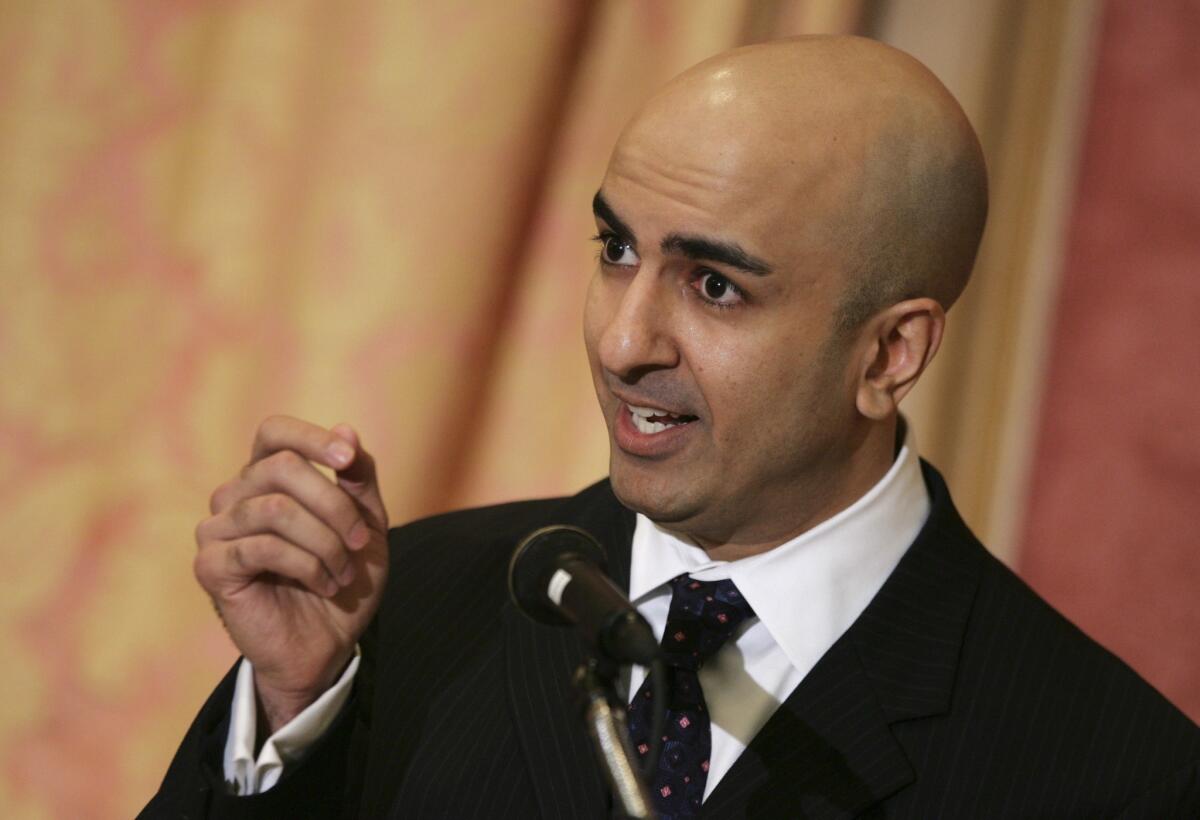Kashkari talks educational inequality at South L.A. church

- Share via
Shifting into general-election mode, GOP gubernatorial candidate Neel Kashkari on Sunday visited an African American church in South Los Angeles, where he emphasized educational inequality as he sought to sway a traditionally Democratic audience.
Kashkari noted that the state’s schools rank in the bottom nationwide, as does the state’s employment rates and level of poverty.
“I’m running for governor because I want to change this. I want to rebuild the middle class, and you do that by making sure young people get a good education and growing the economy so that there are good jobs available so people can work hard and build a good life for themselves,” Kashkari told more than 100 worshipers at the Living Gospel Church.
Kashkari, a former U.S. treasury official and banker, noted that former U.S. Secretary of State Condoleezza Rice has deemed education the “civil rights issue of our time” and highlighted a California court ruling last week that found that teacher tenure and employment rules violate the constitutional rights of poor and minority children.
The decision – a blow to teachers unions – was lauded by the Obama administration, but top California Democrats, including incumbent Gov. Jerry Brown, have remained silent.
“Our leaders in Sacramento may be hiding, but the courts are weighing in to say we have to fight for the civil rights of every kid in California, and I want to be a fighter for their rights,” he said, as the audience applauded.
Education has long been a focus of the candidate, but on Sunday, there was a clear tonal change compared with the spring, when he was courting GOP voters.
During the primary, Kashkari routinely described himself as a “conservative Republican” and vowed to “get able-bodied people off welfare, food stamps and unemployment.” Then, President Obama was a “partisan warrior” who put his party abvet the nation’s interest, and someone Kashkari regretted voting for in 2008.
On Sunday, Kashkari didn’t note his GOP affiliation, compared his and the president’s life stories favorably and repeatedly noted that he worked for Obama as well as for President George W. Bush.
“There is no other country in the world where a brown kid like me, the son of immigrants, gets to go to Washington and work for two presidents. By the way, President Obama would not get elected in Germany or France or China. Only in America,” Kashkari said. “But you know what President Obama and I have in common? We both got that good education, and that good education opened the doors. And if you get that good education, nothing can stop you.”
The shift is born of necessity: Kashkari is the underdog in his race against Brown, and even if every GOP voter in the state voted for him in November, he would come up short. His only hope is convincing independents and some Democrats to support him – a tall order in a state where Brown’s popularity is high.
Kashkari spoke in the simple wood-beam Pentecostal church after the choir joyously welcomed worshipers and congregants offered personal testimonials about their love of the Lord. Kashkari, accompanied by his girlfriend, at one point stood and swayed along with the worshipers, and he donated to the collection basket.
It was the first time Kashkari spoke at the church, but it was his third visit. The other two occurred before his January announcement that he was running for governor, which was noted by Pastor E.A. Jones as he introduced “Brother Kashkari.”
Kashkari, who is Hindu and of Indian descent, highlighted his family’s immigrant roots.
“I was joking with Pastor Jones before the service, when I walk into a community – an African American community or a Latino community – people look at me and say, ‘What is he?’” he said, and the crowd chuckled. He described his parents immigrating from India half a century ago, and sought to tie Indians and African Americans.
“That bond is two great civil rights leaders – Dr. Martin Luther King Jr. here in America, and in India, Gandhi. And both men were giants, civil rights giants that battled injustice through peace and through nonviolent protest, and both men inspired the world to follow their lead, and both men paid the ultimate price for their leadership and died for their causes,” he said. “As you know, Dr. King talked about his vision, his dream for America. I feel like I have lived the American dream.”
Twitter: @LATSeema
More to Read
Sign up for Essential California
The most important California stories and recommendations in your inbox every morning.
You may occasionally receive promotional content from the Los Angeles Times.











